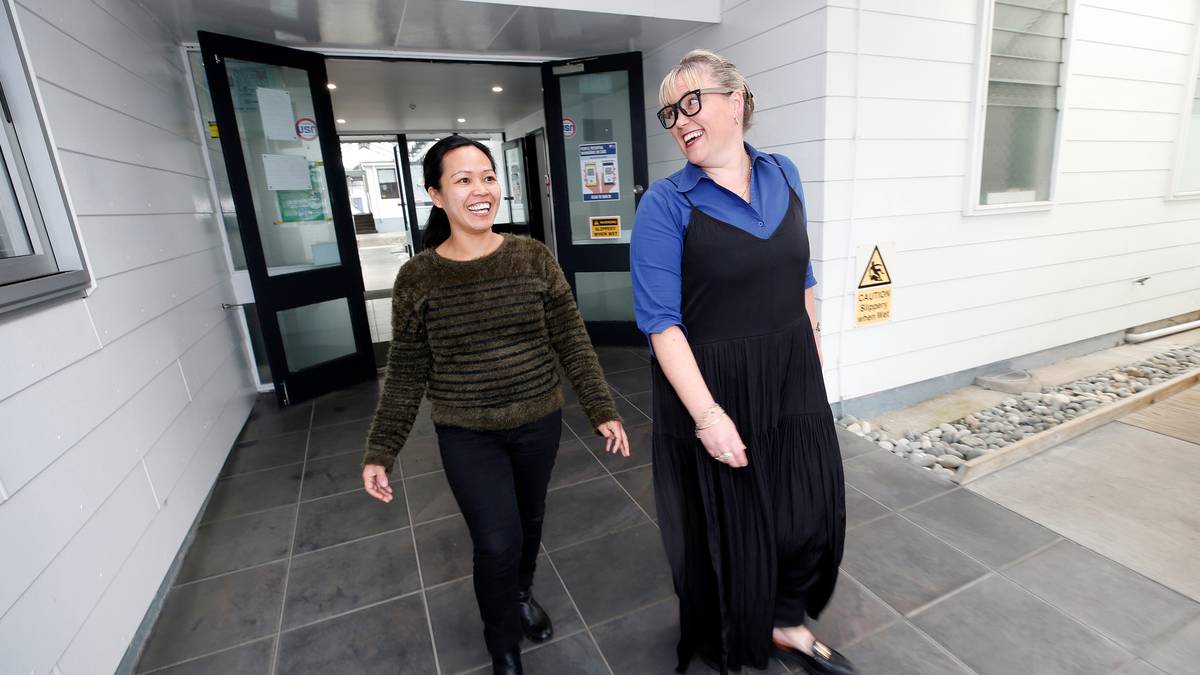People Potential student Marissa Hutchinson and chief executive Bronwyn Ronayne are thrilled with the low unemployment rate in Northland. Photo / Michael Cunningham
More than 1400 jobs across all sectors in Northland are up for grabs in spite of the region recording the lowest unemployment in 15 years.
Labour market figures for the June quarter released by Stats
NZ show Northland’s unemployment rate at 2.9 per cent (2900 people) while 97,800 Northlanders were in employment.
The last time unemployment figures dipped below 3 per cent was in the fourth quarter of 2007 when it was 2.7 per cent. Stats NZ records date back to 1986.
Northland’s highest unemployment since 1986 was 16.3 per cent in the first quarter of 1992.
The national unemployment figure for the end of June was 3.3 per cent.
While the latest figures are good news for Northland, two Northlanders actively looking for work are surprised they can’t find a job at a time when a large number of businesses are desperate for workers.
Nivanha Wharerau-Ripia and Marissa Hutchinson are upskilling at People Potential in Whangārei while applying mostly for work in administration/customer service roles.
“I am trying to stay positive. I really need a job and have not stopped looking. The reply I get from places I apply is they’ve found someone more experienced or qualified,” Wharerau-Ripia said.
She has almost completed her business administration course at People Potential.
She worked temporarily for a manufacturing company until November last year and has been looking for work since in administration/customer service/retail sectors.
Hutchinson is studying computer and business administration and has already applied for two jobs.
She worked in the hospitality sector until last year when she decided to upskill.
/cloudfront-ap-southeast-2.images.arcpublishing.com/nzme/WZSVWP2Q7LQD3P76RFPMRIESS4.jpg)
Trade Me had 745 jobs listed in Northland and Seek 671 as at midday yesterday.
People Potential chief executive Bronwyn Ronayne said her staff fielded requests at least once a week from employers looking for workers.
“It’s a tough market for both employers and workers and one of the things we’ve worked really hard on over the last few years is if someone gets a job, they can still finish their course.
“One advantage students here have is we do have employers looking for workers. We also help students with things like getting their driver’s licence which is really important in the job market,” Ronayne said.
Northland’s working-age population at the end of June was 158,500.
Ministry of Social Development regional commissioner for Northland Graham MacPherson said 501 Northlanders went off main benefits into work in April, 576 in May and a further 474 in June.
Hundreds of Northlanders have found employment and stopped receiving a main benefit in recent months.
“There’s been strong turnouts at recent job expos we organised, where we were pleased to see attendees hired into sectors such as fishing, forestry, construction, childcare and healthcare.
“We know most people want to work, and with the right support they can. This support may involve training or work experience opportunities,” he said.
At the end of June, 6705 people in the Northland Regional Council area had been receiving Jobseeker Support for more than one year.
/cloudfront-ap-southeast-2.images.arcpublishing.com/nzme/VTQMQCYFQUJACFLJJ4DKPDKB6Y.jpg)
That number included both jobseekers, those ready to work as well as people with health problems or disability.
MacPherson said more than 40 per cent of Jobseeker Support recipients in Northland have a health condition or disability which may impact their ability to work.
Northland branch of Hospitality NZ chairman and Kaikohe’s Bank Bar owner John Maurice said while low unemployment was good news, the number of people on Jobseeker Support still troubled him.
The hospitality sector has been one of the hardest hit in terms of finding staff and Maurice said while reopening of international borders from August 1 would help, the Government needed to expediate the process so skilled workers from abroad could start work in New Zealand sooner.
Economist Brad Olsen, from Infometrics, said a tight and challenging labour market with huge competition for jobs especially in construction and healthcare sectors augured well for Northland.
“The other thing we are seeing is there’s considerable increase in pay coming through in some sectors so there’s cold, hard cash to retain and recruit workers.”
Olsen said there would still be areas with labour shortages that could not be filled by overseas workers which gave an opportunity for locals to step up.
Job interview tips
• Find out as much as you can about the role you’ve applied for before interview
• Arrive five to 10 minutes before time
• Look the part – professional appearance and good grooming
• Be positive, confident, and authentic
• Don’t be negative about your former boss, colleagues or workplace




